CRM systems have long promised operational visibility and pipeline control. But in 2025, just logging data into your CRM won't do the cut. Revenue teams now operate in real time and success hinges on faster reaction times, data accuracy, and alignment across sales, customer success, and marketing. That’s why AI-powered CRM alerts have become a foundational pillar of the modern go-to-market tech stack.
Rather than waiting for reports or combing through dashboards, AI tools can now interpret customer behavior, detect risks, and trigger instant alerts inside your CRM, Slack, or email.
These alerts help sales teams take immediate action on things like stakeholder engagement, pricing objections, or churn signals. They reduce reliance on gut feeling and enable data-driven decisions throughout the customer journey.
If you're in RevOps, Sales Ops, or leading a GTM team, this guide is for you. We’ve done the digging to evaluate the best platforms that combine AI capabilities with deep CRM integration. Each one helps your team move faster, stay aligned, and act on customer data in the moment, not a week later during your pipeline review.
Let’s start with the why.
Why Platforms With AI-Integrated CRM Alert Matter
AI-integrated CRM alert platforms combine artificial intelligence, workflow automation, and real-time system integrations to surface the right insights at the right time. They typically:
[blue-section]
- Monitor CRM activity, emails, meetings, and customer interactions
- Use machine learning and natural language processing to flag patterns or anomalies
- Trigger automated workflows or notifications in Slack, Teams, or email
- Provide insights directly within CRM platforms like Salesforce or HubSpot
[/blue-section]
The best platforms orchestrate follow-up actions, streamline sales processes, and eliminate repetitive tasks like manual data entry or follow-up reminders. Whether you’re trying to increase conversion rates, prevent churn, or coach reps, AI alerts are now critical to optimizing revenue execution.
The Modern CRM Problem: Incomplete Data and Slow Reactions
Even with robust CRM software in place, most revenue teams struggle with:
[blue-section]
- Incomplete or outdated crm data
- Lack of visibility into customer behavior or sales engagement
- Missed follow-ups due to disconnected tools
- Manual data entry slowing down reps
- Siloed insights between sales teams, marketing campaigns, and customer support
[/blue-section]
These challenges are especially pronounced in small businesses or growing RevOps orgs juggling multiple apps. That’s where AI-powered CRM systems can step in and unify the picture with real-time, actionable insights.
What to Look for in AI-Integrated CRM Alert Platforms
Here are the must-have criteria to evaluate when choosing a solution:
1. AI Signal Detection
What it should do: Detect and interpret critical signals in customer interactions such as negative sentiment, churn risk, or new stakeholder engagement.
----------
Why it matters: Surface risks and opportunities from voice, text, or behavior data in real time before your team even notices.
----------
Watch out for: Tools that only flag superficial data (e.g., no activity in X days) without deeper sentiment analysis or conversation context.
2. Automated Workflows
What it should do: Automatically trigger tasks, Slack alerts, or CRM updates when certain events occur like a proposal sent or a red flag raised in a meeting.
----------
Why it matters: Saves your sales reps hours per week and reduces dependence on memory or manual coordination.
----------
Watch out for: One-way notification systems with no real workflow automation capabilities.
3. CRM Integration Depth
What it should do: Write directly to CRM fields (e.g., Salesforce, HubSpot), and pull relevant context to personalize alerts and recommendations.
----------
Why it matters: Accurate alerts depend on complete customer data and seamless crm tools integration.
----------
Watch out for: Slack bots that simply read CRM records but can’t push updates or trigger actions from chat.
4. Multi-Channel Alerting
What it should do: Deliver alerts wherever teams work (Slack, email, CRM dashboards) and adapt to different team roles.
----------
Why it matters: Ensures fast action across GTM teams (RevOps, customer success, marketing) instead of letting alerts get lost in dashboards.
5. Data Hygiene & AI-Driven Enrichment
What it should do: Auto-capture meeting notes, contacts, and engagement across email, Slack, and calls to fill CRM gaps.
----------
Why it matters: Clean data fuels everything, from lead scoring to sales forecasting to ai-powered chatbots and automation.
6. Forecasting & Risk Alerts
What it should do: Provide predictive alerts about deal slippage, missing stakeholders, or pipeline shortfalls based on historical data.
----------
Why it matters: Gives leadership early warnings to take action, boosting forecast accuracy and reducing late-quarter surprises.
7. Ease of Use and Team Fit
What it should do: Support your business processes without disrupting daily workflows. Bonus points for intuitive dashboards and chat-first experiences.
----------
Why it matters: AI tools only add value if people use them. Look for user-friendly platforms that integrate with your team’s habits.
Top Platforms Integrating AI Alerts with CRM Systems
Below is a detailed breakdown of leading platforms that integrate AI-driven alerts into crm systems, analyzing their ai features, workflow automation, team fit, and more.
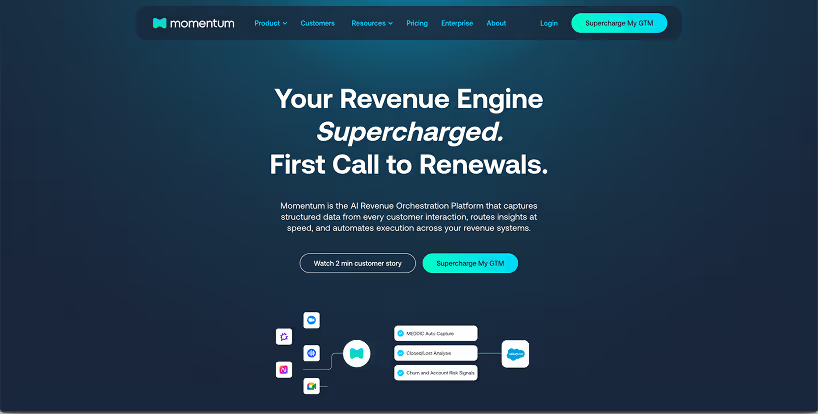
::autoboxgrid2
[LEFT]
Best for:: Mid-to-enterprise teams needing real-time orchestration, not just notifications.
Pricing:: Custom
Key features:: Real-time AI signal detection across calls, emails, and Slack. Auto-updates to Salesforce fields (e.g., MEDDICC, next steps). Slack-based alerts and Deal Rooms. Prebuilt agents for churn, competitor mentions, or product requests. Integrates with Salesforce, Slack, Gong, Asana, HubSpot (soon), and others.
[RIGHT]
Strengths:: Only platform with full two-way sync between Slack and Salesforce. Turns customer conversations into CRM updates, summaries, and follow-up tasks. Eliminates repetitive tasks and boosts customer satisfaction. True ai-powered crm orchestration with workflow automation.
Considerations:: Designed for teams needing full-stack coordination, not a quick Slack bot. Setup and pricing reflect its value as a process engine, not a point solution.
::endautoboxgrid2
2. Gong
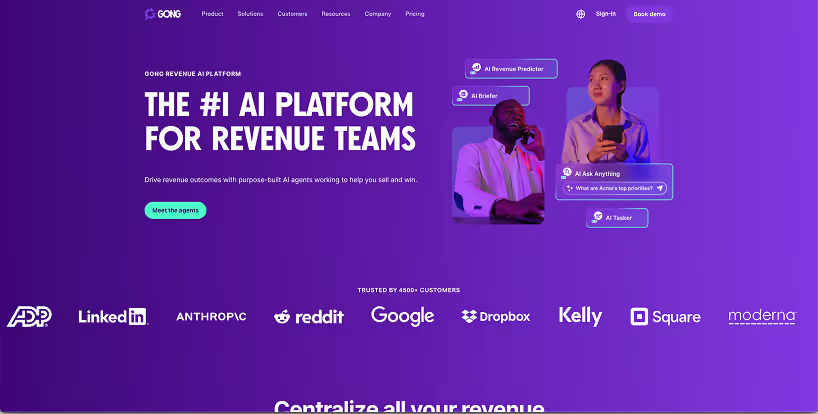
::autoboxgrid2
[LEFT]
Best for:: Sales teams focused on conversation intelligence and coaching insights.
Pricing:: High (usually >$1,000/user/year)
Key features:: AI alerts for deal risks: single-threading, no activity, pricing objections. CRM + Slack integration (read/write to CRM objects). Real-time transcription, sentiment analysis, and alert triggers. Coaching nudges based on talk time, discovery quality, etc.
[RIGHT]
Strengths:: Best-in-class AI tools for surfacing at-risk deals and coaching moments. Strong correlation of CRM and engagement signals. Proven boost in conversion rates and win rates
Considerations:: Slack is primarily used as a notification channel; not a full orchestration layer. Heavy data volume may require robust RevOps filtering.
::endautoboxgrid2
3. Clari
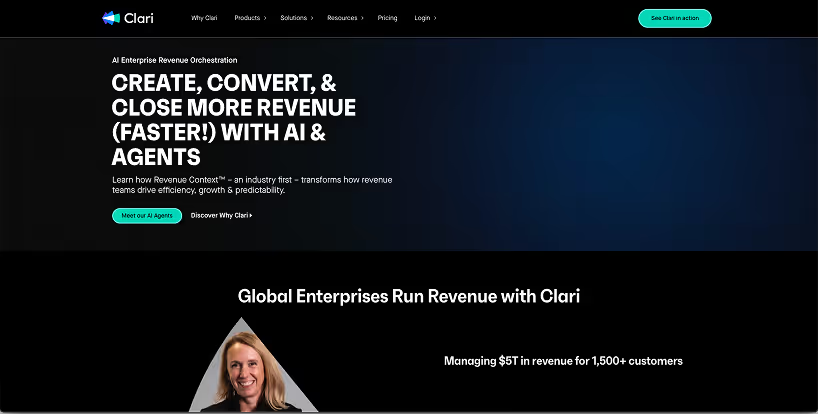
::autoboxgrid2
[LEFT]
Best for:: RevOps leaders needing visibility into forecasts and pipeline risk.
Pricing:: Enterprise-level; typically $1,000+/user/year
Key features:: AI forecasting and “CRM Score” for opportunity health. Alerts for deal slippage, low engagement, or data hygiene gaps. Slack and email-based risk summaries. Coaching prompts and AI-powered dashboards for execs.
[RIGHT]
Strengths:: Predictive modeling based on customer behavior and historical CRM activity. Excellent for enforcing sales processes and detecting forecast risk early. Adds machine learning intelligence on top of your CRM.
Considerations:: Requires solid CRM processes and historical data to perform well. Primarily focused on management use cases, not rep-level automation.
::endautoboxgrid2
4. People.ai
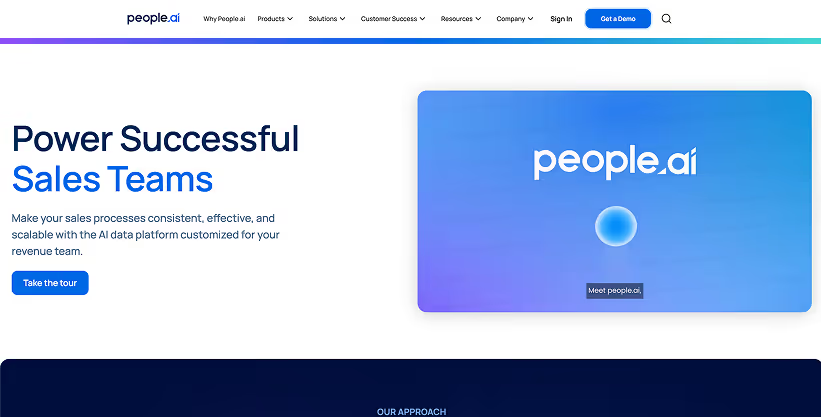
::autoboxgrid2
[LEFT]
Best for:: Teams needing automated CRM activity capture and insight enrichment.
Pricing:: Enterprise; quote-based
Key features:: Automatic logging of emails, meetings, Slack messages. Alerts for missing buyer personas, inactive deals. Cross-functional insights for sales, marketing, and CS. AI-driven next-best-action prompts.
[RIGHT]
Strengths:: Ensures crm data completeness without rep effort. Fills gaps that others rely on—making other AI tools smarter. Unified view across channels to boost customer engagement.
Considerations:: Requires tuning to avoid alert fatigue. May overlap with crm platform native features (e.g. Einstein, HubSpot).
::endautoboxgrid2
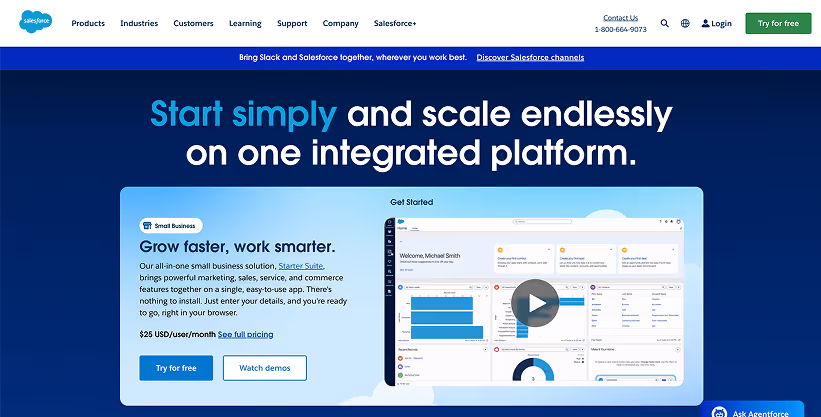
::autoboxgrid2
[LEFT]
Best for:: Salesforce users looking for native, out-of-the-box AI insights.
Pricing:: Included with some Salesforce editions; add-ons for advanced functionality
Key features:: Predictive lead scoring and opportunity scoring. Alerts for inactivity, missing executive engagement. “Next Best Action” recommendations. Slack alerts via Sales Elevate.
[RIGHT]
Strengths:: Fully embedded in the crm software stack, no extra integration needed. Simple to deploy; useful for fast-start AI adoption.
Considerations:: Alerts and scoring models can be opaque (“black box” AI). Lacks depth in ai capabilities compared to dedicated vendors. Limited ai automation or cross-tool actionability.
::endautoboxgrid2
6. HubSpot CRM (with ChatSpot)
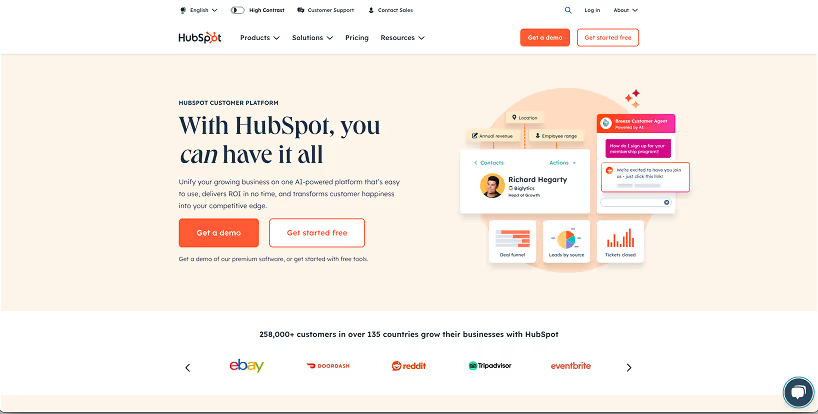
::autoboxgrid2
[LEFT]
Best for:: SMBs or lean sales teams needing built-in, easy-to-use alerts
Pricing:: Included in HubSpot tiers; AI assistants powered by OpenAI
Key features:: Rule-based deal alerts (e.g., no activity in X days). Conversational AI assistant for pipeline Q&A. Slack command integration. Light predictive scoring for leads.
[RIGHT]
Strengths:: Extremely user-friendly and easy to configure. Ideal starting point for teams exploring AI automation.
Considerations:: Slack and AI assistant are basic compared to others. Doesn’t analyze calls or drive multi-step workflows.
::endautoboxgrid2
7. Zoho CRM (Zia), Microsoft Dynamics Copilot, and Pipedrive AI

::autoboxgrid2
[LEFT]
Best for:: Budget-conscious teams with platform-specific needs
Pricing:: Varies by plan
Key features:: Anomaly detection (Zoho), follow-up alerts (MS Copilot), stage time reminders (Pipedrive). Basic conversational AI with CRM integration.
[RIGHT]
Strengths:: Good entry points for automation and ai assistant features. Serve lightweight ai-powered crm systems affordably.
Considerations:: Less capable of full-scale orchestration or predictive analytics. Better suited to small teams with basic CRM workflows.
::endautoboxgrid2
Comparison Table: AI CRM Alert Platforms at a Glance
::autotable
::columns=5
Platform
Primary Strength
AI Alert Highlights
CRM Integration Depth
Ideal For
Momentum.io
Full GTM orchestration & automation
Alerts for churn, pricing, intent, blockers; Slack Deal Rooms
Two-way sync with Salesforce & Slack; CRM write-back
Teams needing real-time workflow automation and visibility
Gong
Conversation intelligence & deal warnings
Red flags like single-threading, pricing tension, no next step
CRM read/write; Slack notifications (one-way)
Coaching-focused sales orgs
Clari
Forecasting, risk prediction, process QA
Pipeline risk alerts, forecast variance, activity gaps
Salesforce/HubSpot overlay; Slack alerts; CRM sync
RevOps leaders improving forecast accuracy
People.ai
CRM data capture + intelligent insights
New stakeholder alerts, missing engagement, AI suggestions
CRM auto-fill; Slack bot for summaries and prompts
Orgs fixing data hygiene and connecting teams
Salesforce Einstein
Built-in AI for native Salesforce users
Lead/opportunity scoring, inactivity nudges, basic Slack pings
Fully native to Salesforce; basic Slack integration
Salesforce-first teams needing quick AI wins
HubSpot
User-friendly AI for small teams
Task alerts, lead revisit notices, conversational AI queries
In-CRM; Slack commands and alerts
SMBs on HubSpot looking for fast, simple alerting
Zoho CRM (Zia)
Low-cost intelligent CRM add-on
Alerts on deal risk, lead anomalies, assistant for CRM queries
CRM native; some Slack integrations
Cost-conscious small businesses
Pipedrive AI
Pipeline hygiene & simplicity
Alerts on deal stalling, task due dates
Native in-app AI assistant
Lightweight sales teams needing reminders
Microsoft Copilot
Email + calendar–based CRM AI
Email follow-ups, call summaries, predictive scoring in Dynamics
Deep Office/Teams/CRM integration
Microsoft 365-centric organizations
::endautotable
Why Momentum Is More Than Just an Alert System
Most platforms on this list do one thing well: they notify you. But Momentum is fundamentally different. It does more than just send alerts: it acts. Momentum’s AI-powered CRM orchestration layer is engineered for modern, fast-moving GTM teams who need their systems to talk to each other and act in sync.
Momentum delivers:
[white-section]
- Real-time alerts for churn risk, competitive mentions, and pipeline blockers
- AI-generated call summaries, auto-filled CRM fields, and follow-up prompts
- Slack-based workflows that spin up Deal Rooms, assign tasks, and notify stakeholders
- Zero manual data entry thanks to its AI agents that update Salesforce on your behalf
- Customizable automations across tools like Gong, Asana, Google Drive, and Jira
[/white-section]
Whether your goal is improving sales forecasting, reducing churn, or streamlining repetitive tasks, Momentum helps you use AI to drive results, not just insights.
Key Momentum use cases include:
[white-section]
- Sales teams using Slack as a command center after every call
- RevOps leaders asking “@Momentum give me an update on Acme Corp” in Slack and getting real-time CRM, call, and follow-up data
- Customer support teams auto-notified of product issues from sales calls
- Marketing campaigns triggered by AI-flagged buying intent or competitor mentions
[/white-section]
Momentum’s generative AI transforms unstructured call data into structured CRM records. Its built-in AI agents and Slack-native workflows are what makes it not just a CRM assistant, but a revenue execution engine.
Final Word: AI CRM Alerts Are Now Revenue Infrastructure
By 2025, the question is no longer “should we use AI?”. It’s “how fast can we operationalize it?”.
Teams that rely on manual updates, dashboards, or scattered CRM tools are already lagging behind.
AI-powered CRM systems have become essential to:
[white-section]
- Route customer inquiries to the right person instantly
- Trigger alerts for customer segmentation, churn, and upselling
- Use algorithms and historical data to suggest next steps
- Generate real-time summaries that fuel better customer experiences
- Drive data-driven decisions based on real buyer behavior, not rep notes
[/white-section]
Whether you’re closing enterprise deals, running marketing campaigns, or coaching sales assistants, embedding AI in your customer relationship management stack unlocks a new level of speed, intelligence, and impact.
Ready to See Momentum in Action?
Thousands of GTM teams already use Momentum to:
[white-section]
- Eliminate manual CRM updates
- Boost sales pipeline visibility
- Trigger workflows for lead management, retention, and customer support
- Cut hours of admin and elevate the entire sales process
[/white-section]
[blue-section]
Book a demo to experience how Momentum integrates with Salesforce, Slack, HubSpot, and beyond—so your team can respond in real time, take action faster, and never miss another revenue signal.
Let AI handle the busywork. Let your team focus on closing deals.
[/blue-section]



.svg)


